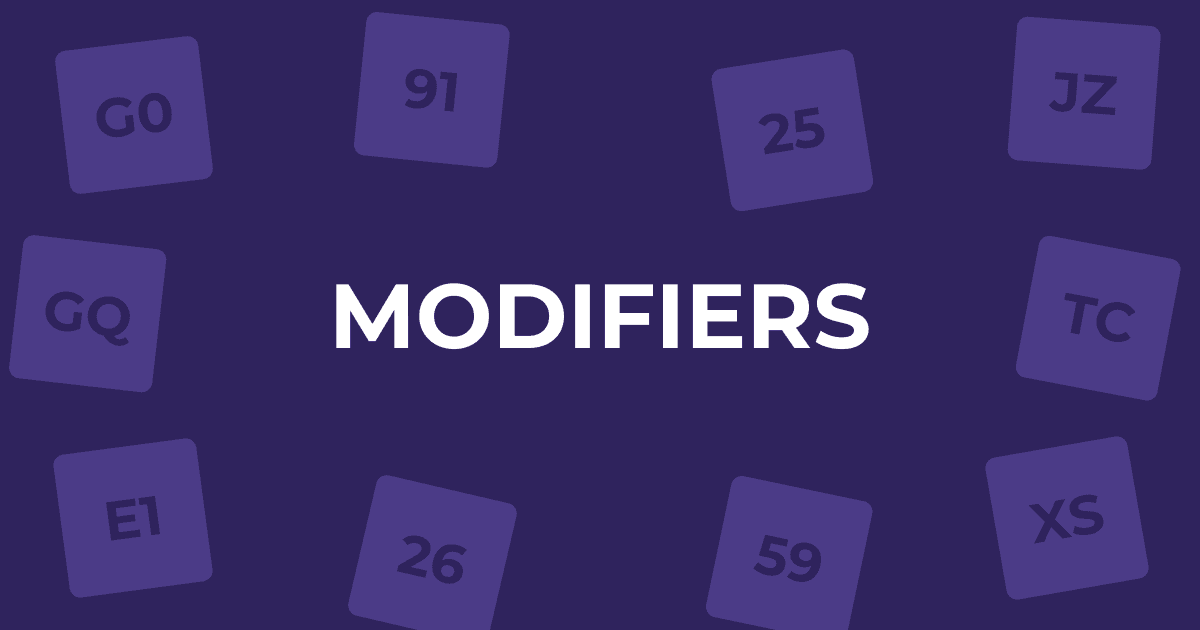Types of Modifiers in Medical Billing and Their Impact on Reimbursements

In medical billing, the correct code for the service is often only part of the submission. Modifiers may also be necessary to add more context. The types of modifiers in medical billing vary with many falling into the category of common.
There are several reasons to include modifiers in a claim, and they can affect your reimbursements.
What Are Modifiers in Medical Billing?
A modifier provides an additional layer of information when added to a coded service or procedure. They can serve several purposes, including:
- Indicating the service or procedure had a specific circumstance but didn’t change in definition
- Providing more information about a service delivered more than once or occurred unusually
- Noting that all services within a bundle did not occur
The goal of using them is to clarify reimbursement, further explain, or qualify a code.
Types of Modifiers in Medical Billing
There are two main classes of modifiers:
Level I Modifiers
These CPT modifiers have two numeric digits, and the American Medical Association (AMA) owns and updates these. They supplement information or enable an adjustment of care descriptions. They don’t change the official definition of the service or procedure.
Examples include:
- Modifier 25: This modifier should be applied when, on the day of a service or procedure, the patient’s condition requires a separate E/M service. It’s not appropriate for billing for post-op services, E/M activities during an office visit with no procedure, or when the procedure is minimal.
- Modifier 26: This code addition bills for the professional components of services where technical services occur, as well. An example is radiology services, where physicians review and note scans. Their work is the professional element, while the machine used is technical.
- Modifier 59: The CPT manual describes it as a “distinct procedural service.” While it’s common, it’s also one misused very often. Experts say you shouldn’t use it to prevent service bundling or bypass a payer’s edit system.
- Modifier 91: This modifier supports repeat testing performed on the same day by the same provider with separate specimens. If multiple results are necessary to fit this description, it’s an accurate application. It’s not for testing errors, a series of different tests, or lab reruns.
Level II Modifiers
Level II modifiers are HCPCS modifiers and use either letters or a mix of letters and numbers. The Center for Medicare & Medicaid Services (CMS) is responsible for this set of modifiers.
The primary use case of Level II modifiers is to identify products, supplies, and services that are not part of codes, such as ambulance services, medical equipment, or prosthetics.
These modifiers can also relate to procedures for certain parts of the body: eyelids, fingers, toes, and coronary arteries. Adding them should detail the circumstances for payment in claims submissions.
The modifiers in medical billing in Level II include:
- E1: Relating to the upper left eyelid
- GQ: This modifier covers billing for asynchronous telecommunication systems when providers collect and store medical history, images, and reports.
- G0: Modifier G0 encompasses telehealth services for diagnosing or treating systems related to an acute stroke.
- JZ: This modifier specifies that a provider fully administered a single-dose container with zero waste.
- TC: A technical component for certain circumstances where it is a charge alone; they are not billed by physicians but by technical providers (e.g., x-ray suppliers)
- XS: Separate structure services that are distinct because they occurred on a separate organ
Types of Modifiers: Pricing and Informational
In addition to the levels of modifiers and if they relate to CPT or HCPCS, there are two other ways to define them—pricing and informational.
Pricing Modifiers
A pricing modifier causes a price change for the reported code. CMS uses the Multi-Carrier System (MCS) for claims processing, which requires these to be in the first modifier position. They must precede informational modifiers. An error here could cause payment delays.
Informational Modifiers
Any modifier not relating to pricing is an informational one. They are secondary in placement on claims. Informational modifiers can impact code reimbursement approval, so they do have relevance in pricing.
What Are the Benefits of Using Modifiers?
In some cases, a modifier is essential to claim approval. Their absence could trigger a denial, which comes back to you for correction. Modifiers are specificity tools, and claims with more of this typically deliver the correct reimbursement amount.
In the case of Level II modifiers, they allow you to receive payment for services not part of codes. Additionally, they support the full reimbursement of services rendered concurrently or in some atypical manner.
Modifier Errors Occur Often, Require Expert Coding
Modifiers are necessary and can be a huge help in medical billing. They can also be the root of mistakes that lead to more denials. They require certified coding expertise. Credentialed coders will have comprehensive knowledge of when to use them effectively. Checking for accuracy can also be part of intelligent automation within technology platforms. Machine learning algorithms could identify modifiers that have the greatest potential for misuse for further review.
Getting modifiers right impacts when you get paid and if the reimbursement is as it should be. It can be an overwhelming part of claims. If you don’t have in-house expertise, you may want to consider outsourcing medical billing and coding. You can review organizations the do this work well here.
Considering a new medical billing company?
Explore our top medical billing companies marketplace.

![Launch a Profitable Medical Billing Company: Complete Guide [2024]](/_next/image?url=https%3A%2F%2Fluminous-respect-c34fb1b082.media.strapiapp.com%2Fstarting_medical_billing_company_guide_bfee001d75.png&w=750&q=75)